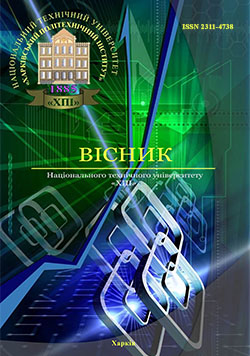FORMATION OF RESPONSIBILITY AS A BEHAVIORAL SPECIALIST COMPETENCE IN PROJECT MANAGEMENT
DOI:
https://doi.org/10.20998/2413-3000.2016.1174.12Keywords:
responsibility, behavioral competence, project management, student, educational process, practical orientation, active learning methods, innovative educational technologyAbstract
The essence of the phenomenon of responsibility is considered. It plays an important role in the life of man and society. A sense of personal responsibility is essential for professional project management. However, with respect to the standard IPMA behavioral competencies of the specialist does not consider responsibility as a competence. This article explains the need to consider the responsibility of one of the most important behavioral competencies of project management specialists. The paper analyzes the problem of studying the phenomenon of responsibility. Examples of his studies in philosophy, psychology, and pedagogy. The approaches to the formation and development of students' responsibility. Emphasized the lack of an integrated system of education accountability in higher education. Illuminated by the author's practical experience in the formation and development of responsibility in the process of teaching of the discipline "managerial competence". In particular, the standard program is supplemented with important topics of the course on the philosophy of management, psychology, management and culture management. It is shown that the effective formation of responsibility of students is necessary to ensure the integrity of the system of educational process and consistently apply active learning methods. It was stressed that the responsibility is required professionally and socially important personal characteristics of a person. This primarily relates to the project and to the members of his project team. It is proposed to include responsibility in behavioral specialist competencies in project management as one of the most important components.References
Platonova A. V. (2007). Problema otvetstvennosti v filosofyi tekhniki [The problem of liability in the philosophy of technology]. Vestnik Tomsk. gos. un-ta - Bulletin of Tomsk State University. 303, 29-31 [in Russian]
Ponomaryov O. S,. & Chebotaryov M. K. (2012) Vidpovidal’nist’ v systemi profesijnoi kompetentnosti fahkivtsja [Responsibility in the system of professional competence of the expert: Textbook]. Kharkiv: NTU “KhPI”, 220. [in Russian]
Reznichenko M. A., Lanskikh M. V., Ponomaryov O. S., & Pazynich S. M. (2012). Rukovodstvo i liderstvo: filosofsko-psikhologicheskyi analiz [Management and leadership: the philosophical and psychological analysis]. Belgorod : ID “Belgorod”, 136 [in Russian].
Grekhnev V. S. (2003) Problema cheloveka v social’noy filoaofyi [Problem of a man in social philosophy]. Moscow: Izdatel’ Savin S. A., 302-331 [in Russian].
Ponmaryov O. S., Chebotaryov M. K., & Sereda N. V. (2013) Vidpovidal’nist’ yak pedagogichna kategoria [Responsibility as a pedagogical category: Textbook]. Kharkiv: NTU “KhPI”, 172 [in Russian]
Yagupov V. V. (2002) Pedagogika [Pedagogy: Textbook]. Kiev: Lybid, 560 [in Russian].
Akoff R. (2002). Akoff o menedjmente [Ackoff about management]. SPb : Piter, 448 [in Russian].
Downloads
Published
Issue
Section
License
Copyright (c) 2016 Олександр Семенович ПОНОМАРЬОВ

This work is licensed under a Creative Commons Attribution-NonCommercial-ShareAlike 4.0 International License.
Our journal abides by the Creative Commons copyright rights and permissions for open access journals.
Authors who publish with this journal agree to the following terms:
Authors hold the copyright without restrictions and grant the journal right of first publication with the work simultaneously licensed under a Creative Commons Attribution-NonCommercial-ShareAlike 4.0 International License (CC BY-NC-SA 4.0) that allows others to share the work with an acknowledgement of the work's authorship and initial publication in this journal.
Authors are able to enter into separate, additional contractual arrangements for the non-commercial and non-exclusive distribution of the journal's published version of the work (e.g., post it to an institutional repository or publish it in a book), with an acknowledgement of its initial publication in this journal.
Authors are permitted and encouraged to post their published work online (e.g., in institutional repositories or on their website) as it can lead to productive exchanges, as well as earlier and greater citation of published work.

